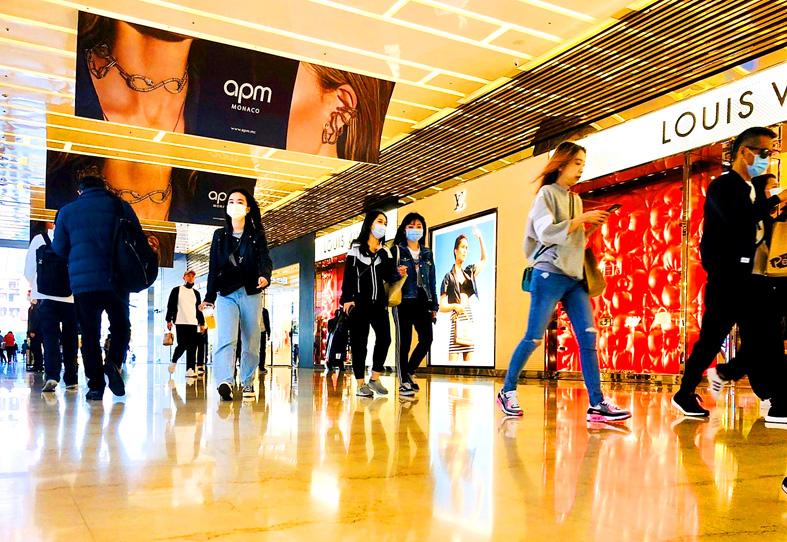Academia Sinica yesterday trimmed its forecast for Taiwan’s GDP growth this year from 3.85 percent to 3.52 percent, while raising its inflation forecast from 2.04 percent to 3.16 percent, saying the economy is losing momentum due to rising consumer prices and other downside risks.
“The economic performance for the rest of this year will not be as smooth and optimistic as previously predicted,” Academia Sinica research fellow Ray Chou (周雨田) told an online news conference, citing an overheating US economy, the Ukraine war, China’s COVID-19 lockdowns and supply chain disruptions.
Global inflation has been rising and major central banks are tightening monetary policy to cool consumer demand and price hikes, Chou said.

Photo: Kelson Wang, Taipei Times
Academia Sinica is the only research body that in December last year forecast a more than 2 percent increase in the consumer price index this year, while other public and private institutes predicted a downhill trajectory.
However, all of the nation’s research bodies and institutions now forecast an inflation of more than 3 percent.
Chou said the central bank would be less active in tightening its monetary policy, causing the New Taiwan dollar to weaken further against the US dollar amid continuing capital flight.
Unfavorable conditions are weighing on the pace of global recovery, although many nations have chosen to live with COVID-19 and lifted disease control measures, he said.
Taiwan’s exports of goods and services, the economy’s main growth driver, could still grow 5.64 percent this year, driven by sustained demand for digital migration and technology innovation by corporations and organizations worldwide, he said.
There is resilient demand for chips used in high-performance computing, data centers and vehicles, but suppliers of electronic components used in smartphones, laptops and TVs are seeing order cancelations and price declines, local technology firms have said.
Local semiconductor firms have largely pressed ahead with capacity expansion plans, boosting private investments, while consumer spending inched up 0.46 percent in the first quarter, Chou said.
Local shipping and airline companies are also aggressively expanding their fleets amid expectations of a recovery in business, he said.
The wholesale price index, a measure of production costs, would likely advance 11.31 percent this year. That would squeeze corporate profit margins unless the companies pass the extra cost burden on to customers, the institute said.
Academia Sinica said it expects the NT dollar to trade at an average of NT$29.17 versus the greenback this year.
The local currency traded at NT$29.914 against the US dollar yesterday.

SEEKING CLARITY: Washington should not adopt measures that create uncertainties for ‘existing semiconductor investments,’ TSMC said referring to its US$165 billion in the US Taiwan Semiconductor Manufacturing Co (TSMC, 台積電) told the US that any future tariffs on Taiwanese semiconductors could reduce demand for chips and derail its pledge to increase its investment in Arizona. “New import restrictions could jeopardize current US leadership in the competitive technology industry and create uncertainties for many committed semiconductor capital projects in the US, including TSMC Arizona’s significant investment plan in Phoenix,” the chipmaker wrote in a letter to the US Department of Commerce. TSMC issued the warning in response to a solicitation for comments by the department on a possible tariff on semiconductor imports by US President Donald Trump’s

The government has launched a three-pronged strategy to attract local and international talent, aiming to position Taiwan as a new global hub following Nvidia Corp’s announcement that it has chosen Taipei as the site of its Taiwan headquarters. Nvidia cofounder and CEO Jensen Huang (黃仁勳) on Monday last week announced during his keynote speech at the Computex trade show in Taipei that the Nvidia Constellation, the company’s planned Taiwan headquarters, would be located in the Beitou-Shilin Technology Park (北投士林科技園區) in Taipei. Huang’s decision to establish a base in Taiwan is “primarily due to Taiwan’s talent pool and its strength in the semiconductor

An earnings report from semiconductor giant and artificial intelligence (AI) bellwether Nvidia Corp takes center stage for Wall Street this week, as stocks hit a speed bump of worries over US federal deficits driving up Treasury yields. US equities pulled back last week after a torrid rally, as investors turned their attention to tax and spending legislation poised to swell the US government’s US$36 trillion in debt. Long-dated US Treasury yields rose amid the fiscal worries, with the 30-year yield topping 5 percent and hitting its highest level since late 2023. Stocks were dealt another blow on Friday when US President Donald

UNCERTAINTY: Investors remain worried that trade negotiations with Washington could go poorly, given Trump’s inconsistency on tariffs in his second term, experts said The consumer confidence index this month fell for a ninth consecutive month to its lowest level in 13 months, as global trade uncertainties and tariff risks cloud Taiwan’s economic outlook, a survey released yesterday by National Central University found. The biggest decline came from the timing for stock investments, which plunged 11.82 points to 26.82, underscoring bleak investor confidence, it said. “Although the TAIEX reclaimed the 21,000-point mark after the US and China agreed to bury the hatchet for 90 days, investors remain worried that the situation would turn sour later,” said Dachrahn Wu (吳大任), director of the university’s Research Center for